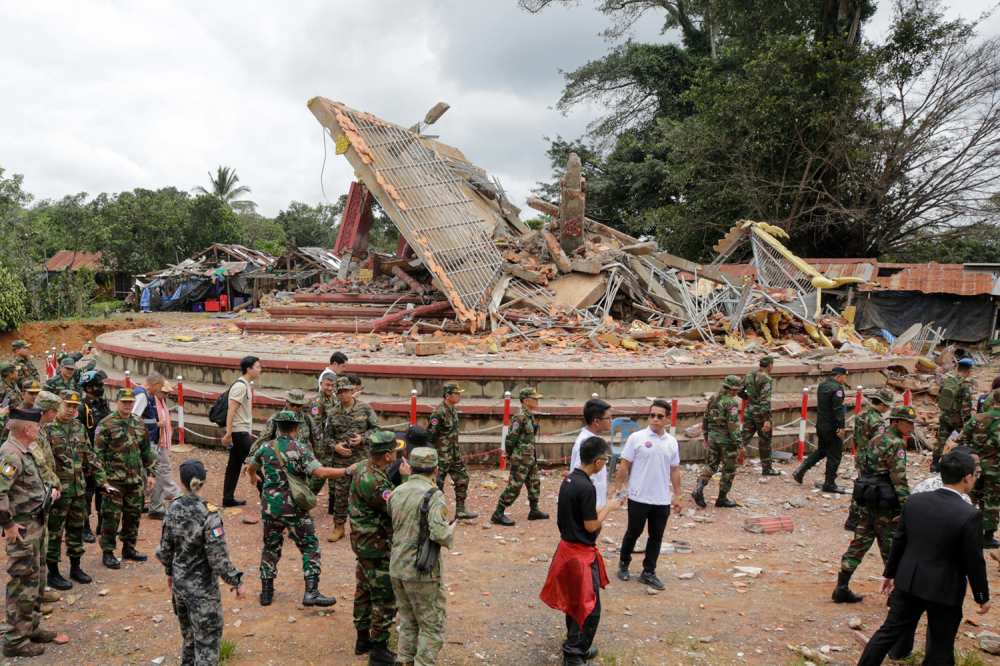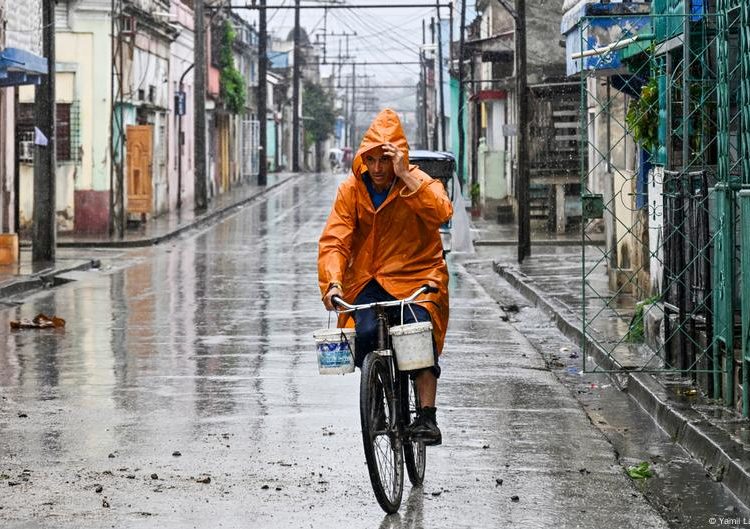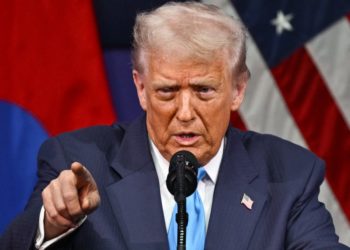CAMBODIA—By July 28, O’Smach, on Cambodia’s northern border, had become a ghost town. Five days of intense fighting with Thailand, erupting after months of tensions over contested territory, saw more than 260,000 people driven from their homes on both sides of the border. Families streamed out of nearby villages toward makeshift camps. As an older man who stayed behind pointed out shelling damage to his neighbors’ home, a drone appeared overhead, sending him running to the trench he’d dug in his yard.
Not everyone had the chance to flee. Cambodia’s 2019 census put O’Smach’s population just over 9,850, but that doesn’t include the prison-like, office-dormitory compounds that have appeared here over the past five years, with the capacity to house 10,000 more.
Around 50 sites like these now line the Cambodia-Thailand border, designed to house a slice of the trillion-dollar cybercrime industry—primarily teams running investment scams, dubbed “pig butchering” for the way they fatten their targets up; sextortion scams that blackmail victims, including children, by threatening to make sexual images public; scams that impersonate police to gain account access; and fraudulent online gambling sites. Once aimed largely at the Chinese public, these now target victims worldwide and rake in tens of billions of dollars a year in Cambodia alone.
The compounds evolved from a casino industry that caters mostly to Chinese tourists and Thai day-trippers and has been linked to human trafficking, drug smuggling, and the endangered wildlife trade. From 2016, physical casinos were dwarfed by the online gambling industry (outlawed by Cambodia in 2019), which progressed to illegal sites and outright scams. Operators rent space in casinos and purpose-built compounds controlled by Chinese criminals, Myanmar warlords, and the Cambodian political elite.
Scam companies rely heavily on forced and trafficked labor from Asia, Africa, and Latin America to chat with targets, pose as romantic interests and employees at fake investment platforms, and persuade them to make deposits. Survivors tell us that torture, rape, and beatings are common. As the fighting raged in July, some trafficking victims reached out for help, saying they were locked in their dorms by their bosses. Videos shot from inside these sites show missiles flying overhead, explosions thundering outside, some workers appearing to break out and run, and damage from shelling in the grounds.
The surface cause of the conflict—still simmering more than a month after the cease-fire—is a decades-long dispute over ancient temples and an ambiguous border. But beneath the nationalist rhetoric lies a more strategic target: the proliferating scam compounds along the 500-mile shared border, both implicating and impacting economic, security, and political interests on both sides. When Thai and Cambodian generals met in May to discuss pulling troops out of a disputed temple site, they also covered scams.
These are especially antagonizing to Thailand, whose citizens are defrauded out of an estimated 115.3 billion baht (about $3.6 billion) every year and targeted by traffickers and recruiters to work for scams.
Thailand wants to be seen as a crusader against this but is keeping its most strident actions quiet. Shuttering compounds risks losing leverage over Cambodia, where the industry accounts for up to 60 percent of the economy, and could make hundreds of thousands of stranded criminals and trafficking victims Thailand’s problem. Cambodia wants public outrage at Thai attacks on its soil but must avoid mentioning any scam compounds hit. Both accuse each other of aggression and violations of international law but obscure the specifics on the ground.
While border clashes can galvanize support, criticizing scam compounds, a major earner for elites close to Cambodia’s ruling family, appeared to cross a line for Hun Sen—former prime minister, father of the current prime minister, and head of the Senate—rupturing ties with longtime ally and former Thai Prime Minister Thaksin Shinawatra. By 2025, both men’s children had taken their old jobs, but Hun Sen’s relationship with Thaksin’s daughter Paetongtarn was fraught.
Paetongtarn publicly pressured Hun Sen to crack down on scams targeting Thais, which Cambodia insisted did not exist, and, as he saw it, let Thai media humiliate him by saying Cambodian troops “withdrew” from a contested area despite Hun Sen claiming he’d negotiated a compromise. As Hun Sen later expressed in a rambling three-hour speech, such disrespect was intolerable. On June 18, he leaked a secretly recorded call in which Paetongtarn deferentially called him “uncle” and spoke disparagingly of one of her generals.
Paetongtarn retaliated by vowing to dismantle Cambodian scam operators, but the Thai public had already turned on her. Rallies organized by the Yellow Shirts movement, which helped the military force her father and aunt out of office in 2006 and 2014, respectively, surged in support. Paetongtarn was suspended and then removed from office in late August. “I cannot forgive you, and Cambodia cannot work with [you],” Hun Sen said in his June speech. “You can insult your generals, but you cannot insult Hun Sen.” (He often refers to himself in the third person.)
“The principal driver of this conflict is that it shores up or capitalizes on nationalist sentiment on both sides of the border,” said Jacob Sims, a fellow at Harvard University’s Asia Center and the author of a report on Cambodia’s compound crisis. Beating the war drums is a handy distraction from Cambodia’s growing economic problems, he added, which “deflects international pressure away from the scam economy.”
The Thai side of the border is tightly controlled, with the army declaring martial law in some provinces and banning drone photography countrywide, while Cambodia shuns media engagement and repeatedly detains journalists attempting to cover Thai incursions. Both sides accuse the other of responsibility for the scam, illegal gambling, and human trafficking crises drawing the ire of governments from China to the United States but avoid acknowledging the physical compounds directly on the battlefield.
For Hun Sen, attacks on the scam industry are personal. Reports from Amnesty International, the United Nations Office on Drugs and Crime, the Global Initiative Against Transnational Organized Crime, and other organizations paint Cambodia as the epicenter of Southeast Asia’s $44 billion a year—and growing—scam industry. In May, the United States moved to blacklist the Huione Group, linked to Hun Sen’s nephew Hun To, for using its payment and escrow services to launder billions of dollars from organized crime.
In Cambodia, money flows upward, with tributes paid through patronage networks. Getting projects approved is pay-to-play, brokered by aristocrat-tycoons (oknhas) who buy their titles and privileges from the ruling party. The system means no major industry can exist without enriching the Huns, while their power hinges on being the gatekeeper. To get the green light for casinos and compounds, criminal investors need to work with elites favored by Hun Sen, while scam companies renting space inside need to know they’re protected. If those at the top can’t promise this, the whole system falls apart.
Hun Sen “is panicking over the potential collapse of a regime deeply entangled with international criminal networks,” Sam Rainsy, the exiled leader of the Cambodian opposition, said in a statement in late June. Hun Sen’s fury toward Thailand, Rainsy said, stems from the “growing threat to the illicit revenue streams that sustain his power … a vital source of funding for the current Phnom Penh regime.”
In June, Thai media accused Hun Sen of being the “political patron” of borderland compound operators, including a provincial governor and Sen. Kok An, for whom Thai police have issued an arrest warrant. When fighting broke out, scam compounds linked to Cambodian elites were swiftly hit by Thai shelling. Some could feasibly be collateral damage, but at least one was deliberate: a former casino accused of being a brutal scam compound with high-level political protection.
The Thai army claimed the building was abandoned and only targeted because it stored heavy artillery. The army did not mention scams or that it had shelled a second casino compound owned by the same political figure, while a third—still actively recruiting for scam workers in June—was in an area under heavy fire. Also targeted (confirmed by Cambodia’s defense ministry) was Thma Da, a remote mountain outpost 100 miles away from the contested temples and home to a so-called special economic zone widely alleged to be a scam compound park.
A self-described “dog pusher” (a low-level position in the scam hierarchy) who shared images of the missiles on Telegram wrote in Chinese, “They are still fighting and not retreating. … We poor people here are still pushing. Missiles are almost flying to our faces. Still no evacuation.”
Neither side explained why Thailand targeted Thma Da, on Cambodia’s southwestern border, during a battle over contested territory in the north, but evidently it was not a surprise. Six weeks earlier, the provincial governor began evacuating the area, and in July, the Thai army declared martial law in the district opposite. The week before the strikes, hundreds of Vietnamese people who said they had been trafficked by the Chinese escaped from a compound and were caught trying to flee—something few trafficking victims attempt in a location so isolated, heavily patrolled, and surrounded by land mines.
With no obvious link to the border dispute, the real target in Thma Da appears to have been Hun Sen’s inner circle. The United States sanctioned the SEZ and its owner, Try Pheap, for corruption and human rights violations in 2019, but Try Pheap, once Hun Sen’s personal advisor, remains close to the ruling family. The SEZ was a joint venture with the Heng He Group, two of whose owners and one of whose subsidiaries were also designated by the U.S. Treasury for sanctions on September 8. Several of the group’s constituent companies list Hun To as a director.
Photos from 2021 show the Cambodian name of one of these companies, Heng Zhen Yule City, emblazoned on the main casino-hotel. For the Thai military, targeting this site may signal a strike at assets believed to belong to Hun Sen’s family and friends. (For good measure, Thailand also shelled Try Pheap’s house on the northern border, also attached to a casino development.)
A spokesperson for Thailand’s Ministry of Foreign Affairs did not respond to emailed questions about the borderland scam compounds but said the military’s response has been “carefully targeted, proportionate, and fully consistent with international law.”
Representatives of the Royal Cambodian Armed Forces declined to comment.
“It’s not out of the question that Thailand is targeting these places because they’re seeing evidence of military buildup within the compounds and viewing these as strategic military targets,” Sims said. “But it’s more likely to me that they’re trying to take out the [ruling] party.”
When rockets began to fly in July, scam workers speculated on Telegram that Thailand was “doing a northern Myanmar”—a joint China-Myanmar war on scams that has led to more than 57,000 arrests. Just before the fighting broke out, Thailand announced a partnership with Interpol to dismantle Cambodia-based scams and plans for a “war room” for slashing compound- and trafficking-related crime.
While Thailand’s involvement in the Myanmar crackdown was, Sims said, “almost transparently fully precipitated by Chinese pressure,” Thailand, which is heavily targeted by Cambodia-based scams, has been aggressive in “speaking out about it and pushing Cambodia to let them get the Thais out of there.”
While Thailand clearly wants scammers to stop targeting Thais, it does not seem sincere about disrupting the industry. In March, the U.N. reprimanded Thailand over its role as a trafficking transit hub and for supplying resources to compounds. Survivors trafficked overland into Cambodia told us that their handlers bribed Thai border officials, and satellite imagery at remote crossings suggests that these are key routes for ferrying people to compounds. An archived version of the now-deleted Heng He Group website publicized past visits to MDS Thmorda SEZ by Thai provincial governors, senior police chiefs, border officials and military figures – including, it claimed, to co-ordinate on practical matters like visas and inspections.
The Thai military assumed control of all border checkpoints in June. Officially, these remain closed except for returning Cambodians and Thais, but even at the height of hostilities, when Thai tanks were pointed at the scam-dominated town of Poipet—a major flash point for trafficking into compounds—almost everyone lining up to cross held third-country passports, and none were willing to say where they were going.
The military has yet to demand closures or express concern for workers trapped inside. There have been no raids or rescues, even in compounds that straddle the border, where Thai authorities could easily gain access. Bangkok likely fears a repeat of the Myanmar crackdown, when it shouldered the burden of processing and repatriating 10,000 people removed from compounds. But the complicity of silence is a troubling sign that whatever deals are negotiated over this multibillion-dollar scam industry will stay in the shadows—and the compounds will stay intact.
The post Are Scam Compounds the Real Cause of Thailand-Cambodia Fighting? appeared first on Foreign Policy.




